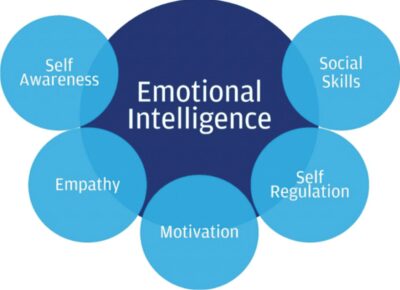What qualities come to mind when you think of a “Developed Personality”?
We might picture someone who stays calm in heated situations and never lets his temper gets out of control or a leader who trusts his staff and morally supports them when needed, listen to his team and try to be a person easy to talk with.
Now, when it comes to your own yourself. The common questions we ask ourselves are, Are you an Emotional Person? Do you understand your emotions well? What is an Emotional Intelligence? These are some common questions that come into our minds while interacting in society. Sometimes our knowledge and wealth feel worthless if we don’t understand or interact well in society. So, when it comes to a successful and happy life, Emotional Quotient (EQ) matters as much as Intelligence (IQ), and in this article, we will try to figure out what is emotional Intelligence actually means, and it will be beneficial in our day to day lives.
“Emotional Intelligence is the ability to understand our emotions and empathize with others, Use our emotions in positive ways to improve personality, communicate much effectively, build stronger relationships, overcome the challenges in our lives and defuse conflicts, etc.” Emotional Intelligence helps you succeed in study and work to achieve success in career and personal goals.
It can also help us understand our feelings, turn intention into action and make good decisions about what matters most.

The term EI was used many times in between the 1930s to 1980s in various articles describing it as “Social Intelligence,” but it gained popularity in 1995 after the publication of Daniel Goleman’s book “Emotional Intelligence” in which he claimed that to become successful in life, our IQ matters 20% where our EQ matters 80%, and that’s why he stated “Why it matters more than IQ” as the tagline of his book. After that, EI continued to capture the public interest and became an important field in education and business.
Emotional Intelligence is commonly defined by five attributes:
1. Self-Awareness:
Self-awareness means to recognize your own understand your own emotions. How can they affect your behaviors and thoughts, having a clear picture of your strengths and weaknesses, and how to develop self-confidence. Being Self Aware Person also helps you understand how your actions can affect the people in society and let you allow to behave with Humanity.
2. Self-Regulation:
Self-Regulation means managing your emotions in healthy ways and staying in control. Regulating emotions and responding appropriately with self and the emotions of others are all important aspects of self-regulation. If we know our values, hold ourselves accountable for our mistakes, and correct them, practicing being calm in heated situations will help us develop self-regulation. It will help us earn the respect of those around us.
3. Motivation:
How to stay motivated or motivate yourself is an important aspect of life. External motivation can affect you for a vary limited time, but self-motivation can lead to extremely high standards for the quality of work and life, being hopeful, and finding something good because there is always something positive if you look for it. Self-motivation can always help you look at difficult situations in a new way and overcome challenges positively.
4. Empathy:
If you are a leader or want to be a leader, then having empathy is a must to manage a successful team in any organization. Leaders with empathy can have the ability to put themselves in someone else’s shoes and support them morally and practically. They can build a great team, use constructive criticism from improvement, and deliver the best results with team efforts. If you want to earn loyalty and respect from a person or team, show them care by being empathic.
5. Social Skills:
Social skills are the ability to understand the emotions of others, for Ex. They are learning how to praise others, communicate (Communication Skills), conflict resolutions, etc. People with the good social skill element of Emotional Intelligence are great communicators; they are good at supporting the team and resolving conflicts diplomatically. To be good in Emotional Intelligence, one must have an excellent understanding of how their actions and emotions affect their surrounding people.
Understanding Emotions can help us to develop personality, improve communication skills as well as help us to be a well-being person. Many experts, including Danial Goleman, believe that Emotional Quotient (EQ) is more important to becoming successful in life than IQ. Most of the time, people with pleasing EQ hire people with good IQ.
However, there are some drawbacks to having a very high level of emotional Intelligence. People with high EI may find it challenging to deliver negative feedback for fear of hurting people. On the other hand, some can misuse it for manipulative and deceptive purposes. Some research also suggested that people with high EI may be less innovative.
Overall, Emotionally Intelligent People understand that emotions can be powerful but also temporary. If we genuinely want to develop ourselves then understanding our emotions and developing EI can be a good start with some basic things such as
• Think Before React.
• Manage Highly Charged emotions like Sadness and Anger.
• Great Self Awareness and Empathy for Others.
• You are a Good Listener.
• Accepting criticism and responsibilities and Constantly improving yourself.
• Not Being Judgmental for Others.
The more You can grow in these areas, the more emotionally intelligent you can be, which will surely help you in your Social, Professional, and Personal Life
(Software Engineer, International NLP Master, Motivational Speaker, Corporate Trainer, Author of Book “Ek Shuruaat- Kaamiyabi ki Raah Me”)


COMMENTS